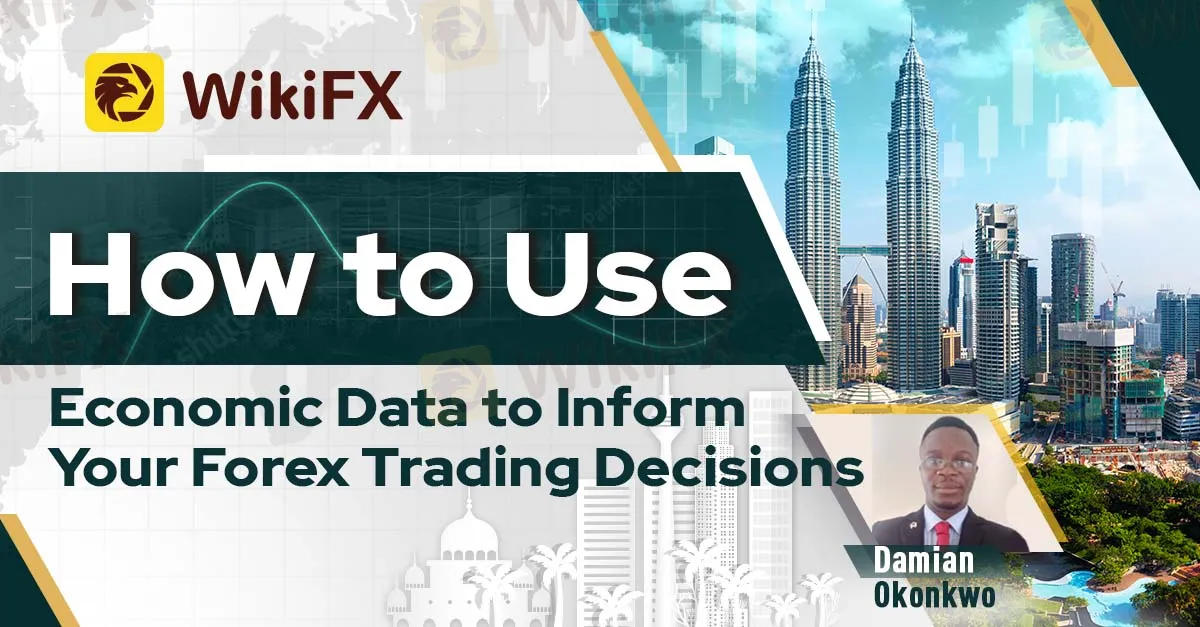简体中文
繁體中文
English
Pусский
日本語
ภาษาไทย
Tiếng Việt
Bahasa Indonesia
Español
हिन्दी
Filippiiniläinen
Français
Deutsch
Português
Türkçe
한국어
العربية
How to Use Economic Data to Inform Your Forex Trading Decisions
Abstract:While technical analysis can provide valuable insights, it's crucial to consider the broader economic landscape and consider the economic data to make informed trading decisions.

By: Damian Okonkwo

How to Use Economic Data to Inform Your Forex Trading Decisions
In the fast-paced world of forex trading, each decision made by a trader matters so much to his positions. While technical analysis can provide valuable insights, it's crucial to consider the broader economic landscape and consider the economic data to make informed trading decisions.
Economic data encompasses a wide range of indicators, such as:
● Gross Domestic Product (GDP): Reflects the overall health of an economy.
● Interest rates: Set by central banks and influence currency valuations.
● Inflation: Measures the rate at which prices increase.
● Trade balance: This gives the disparity between a country's exports and imports statistics.
● Unemployment rate: Indicates the level of economic activity.
● Consumer confidence: Shows how optimistic consumers are about the economy.
Understanding how these indicators interact and impact different currencies is essential for successful forex trading.
Using Economic Data to Make Informed Decisions
Here's how you can use economic data to make informed trading decisions:
1. Identify key economic events:
Economic calendars are essential tools for forex traders. They provide a comprehensive overview of upcoming economic events, along with their potential impact on specific currencies. By focusing on high-impact events, such as:
● Central bank interest rate decisions: Impacting currency valuations.
● Non-farm payrolls: Providing insights into the health of the U.S. economy.
● Retail sales: Reflecting consumer spending and economic activity.
● Manufacturing indexes: Indicating the strength of a country's manufacturing sector.
● Trade balance: Influencing currency valuations based on exports and imports.
2. Analyze the data:
It's crucial to not only identify key economic events but also interpret their implications. Compare the released data to forecasts and historical data to assess the surprise factor and potential impact on the market.
For example, if a central bank raises interest rates more than expected, it could strengthen that country's currency relative to others. Conversely, a weaker-than-expected GDP report could indicate a slowing economy and potentially weaken the associated currency.
3. Align your trading strategy:
Based on your analysis of the economic data, you can adjust your trading strategy accordingly. This could involve:
● Entering long positions if you anticipate a currency strengthening.
● Entering short positions if you anticipate a currency weakening.
● Exiting existing positions if the data suggests a change in market sentiment.
● Hedging your portfolio to protect against potential losses.
4. Manage risk effectively:
Economic data can be unpredictable, so it's crucial to manage risk effectively. This includes:
● Setting stop-loss ordersto limit potential losses.
● Using position sizing to avoid overexposure to any single currency.
● Diversifying your portfolio to spread risk across different currencies and asset classes.
Conclusion
By effectively using economic data, forex traders can gain valuable insights into market movements and make informed trading decisions, ultimately increasing their chances of success in the competitive world of forex trading.

Disclaimer:
The views in this article only represent the author's personal views, and do not constitute investment advice on this platform. This platform does not guarantee the accuracy, completeness and timeliness of the information in the article, and will not be liable for any loss caused by the use of or reliance on the information in the article.
Read more

The Hidden Checklist: Five Unconventional Steps to Vet Your Broker
Forex broker scams continue to evolve, employing new tactics to appear credible and mislead unsuspecting traders. Identifying these fraudulent schemes requires vigilance and strategies beyond the usual advice. Here are five effective methods to help traders assess the legitimacy of a forex broker and avoid potential pitfalls.

Doo Financial Obtains Licenses in BVI and Cayman Islands
Doo Financial, a subsidiary of Singapore-based Doo Group, has expanded its regulatory footprint by securing new offshore licenses from the British Virgin Islands Financial Services Commission (BVI FSC) and the Cayman Islands Monetary Authority (CIMA).

CFI’s New Initiative Aims to Promote Transparency in Trading
A new programme has been launched by CFI to address the growing need for transparency and awareness in online trading. Named “Trading Transparency+: Empowering Awareness and Clarity in Trading,” the initiative seeks to combat misinformation and equip individuals with resources to evaluate whether trading aligns with their financial goals and circumstances.

Malaysian-Thai Fraud Syndicate Dismantled, Millions in Losses Reported
The Royal Malaysia Police (PDRM) has received 26 reports concerning the Nicshare and CommonApps investment schemes, both linked to a major fraudulent syndicate led by a Malaysian citizen. The syndicate’s activities came to light following the arrest of its leader by Thai authorities on 16 December.
WikiFX Broker
Latest News
AIMS Broker Review
The Hidden Checklist: Five Unconventional Steps to Vet Your Broker
YAMARKETS' Jingle Bells Christmas Offer!
Why is there so much exposure against PrimeX Capital?
Russia to Fully Ban Crypto Mining in 10 Regions Starting January 1, 2025
MTrading’s 2025 "Welcome Bonus" is Here
Doo Financial Obtains Licenses in BVI and Cayman Islands
CFI’s New Initiative Aims to Promote Transparency in Trading
Currency Calculator


